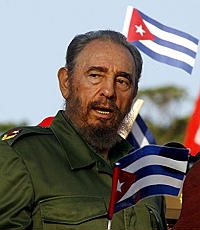U.S. lawmakers: Cuban officials say Castro to return to public life
Fidel Castro does not have cancer or a terminal illness and will eventually return to public life, Cuban officials told visiting U.S. lawmakers in the communist government's most comprehensive denial of rumors about the ailing leader's health.

U.S. Rep. Jeff Flake, an Arizona Republican, said all the Cuban officials they spoke to during the three-day trip that ended Sunday told them the 80-year-old leader's "illness is not cancer, nor is it terminal, and he will be back."
Acting President Raul Castro did not meet with the 10-member U.S. delegation and lawmakers said his absence was evidence of the political uncertainty created by Cuba's insistence that Fidel Castro will return to power.
"The party line is that Fidel is coming back, which ... creates a sort of vacuum," said Rep. Jane Harmon of California.
U.S. officials have said they believe Fidel Castro suffers from some kind of inoperable cancer and will not live through the end of 2007.
Castro has not been seen since July 26, five days before he temporarily ceded power to his younger brother to recover from surgery from intestinal bleeding. His failure to show up at his own delayed birthday celebrations earlier this month sparked rumors that he was on his deathbed.
Vice President Carlos Lage has previously shot down reports that the leader was suffering from stomach cancer, but officials had not publicly denied rumors that he could have another type of cancer or some other terminal illness.
Some U.S. doctors have speculated that Castro could have diverticular disease, which can provoke bleeding in the lower intestine, especially in people over 60.
The condition involves weakened spots in the intestinal lining that form pouches, which can become inflamed and lead to bleeding. In severe cases, emergency surgery many be required for reasons including continued bleeding, a large abscess, perforation or peritonitis.
Such emergency surgery usually involves two operations. The first surgery will clear the infected abdominal cavity and remove part of the colon and involve a temporary colostomy to allow normal eating and bowel movements. In a second operation, the ends of the colon are rejoined.
On Friday, the Communist Party daily newspaper reported that Castro telephoned a meeting of provincial legislative leaders and talked to Venezuelan President Hugo Chavez, the first news in 11 days about the convalescing leader.
The 75-year-old Raul Castro has appeared increasingly confident in his new role since July. The younger Castro has called on two occasions for normalized relations and improved dialogue with the United States. The visit by the U.S. lawmakers was a response to that call, said William Delahunt, a Massachusetts Democrat.
"It's incumbent on us, representing the first branch of our democracy, to come here and to state that we are willing to engage in a sincere and open dialogue, and that everything is on the table," he said, reports AP.
The trip "underscores the desire for a change in policy that we believe is embraced by most Americans," he said.
U.S. State Department spokesman Sean McCormack said Friday the lawmakers' trip would have no effect on official U.S. policy toward Cuba.
"This divide over whether or not to have an embargo on Cuba or to lift it, it's a debate that's been going on for some time. We understand that there are some in Congress who have a very different view. As a matter of policy, we of course have an opposite view from the folks that are down there today," he said.
The United States has maintained a trade and travel embargo against Cuba for more than four decades. The representatives were united in their call for that embargo to be lifted, calling U.S. policy toward Cuba "an abysmal failure" and "a relic of the Cold War."
Subscribe to Pravda.Ru Telegram channel, Facebook, RSS!




